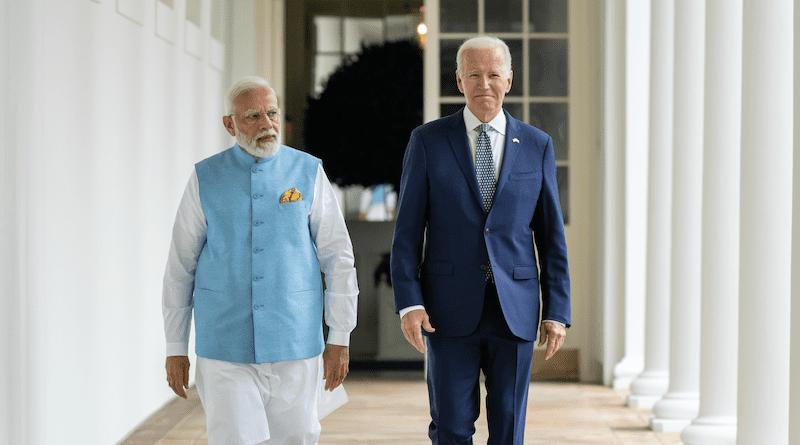Modi’s Visit To America: A Focus On Human Rights – OpEd
The recent trip to the United States by Prime Minister Narendra Modi was a significant diplomatic achievement. It was accentuated by a number of bilateral and group talks with President Joe Biden and other international leaders, as well as the introduction of new alliances and agreements in a number of industries with the commitment to a solid bilateral partnership between the two nations being reaffirmed.
However, during their conversation, President Joe Biden voiced worries about how Muslims are being treated in India, bringing up the subject of human rights. It is crucial that the nation claiming to be the greatest democracy in the world uphold its democratic promises and defend the rights of every person in good faith.
The visit drew condemnation and demonstrations from human rights organizations, MPs, and activists who charged Modi with being responsible for the deteriorating human rights situation in India, particularly in relation to how religious minorities, journalists, and civil society are treated. In a letter to Biden before Modi’s visit, 23 US congressmen urged him to express his concerns about human rights abuses in India, including the persecution of dissent, the erosion of civil liberties, the repression of minorities and Dalits, and the carnage in Kashmir. Moreover, Biden was also urged by 50 civil society organizations to question Modi about extrajudicial killings, torture, political prisoners, and religious violence. Modi emphasized in his speech before congressmen, India’s commitment to democracy and pluralism. Despite the particular issues that the lawmakers had brought up regarding his government’s record on human rights, President Modi rejected the notion that there was any religious prejudice in India.
The ground reality of Human Rights conditions in India
Numerous people have been held without charges because of the Public Safety Act of Jammu and Kashmir, which permits imprisonment without suspicion for up to two years. Security forces killed three people in July 2020, mistaking them for militants despite the fact that they were laborers. Even in instances of serious violations of human rights, security forces are protected from punishment by the Armed Forces Act.
In 2020 and 2021, there was violence between communities in India, which was frequently started by BJP followers or politicians who disregarded minorities. In February 2020, Delhi had the bloodiest riot in decades, which claimed at least 53 lives. A Hindu religious gathering in New Delhi in April 2021 burned Muslim-owned buildings. In Uttar Pradesh’s Hathras region in September 2020, Dalits also experienced discrimination and brutality from higher caste groups.
Journalists, activists, students, and intellectuals who disagree with the policies of the government in India sometimes face unfair arrests and prosecutions. The Unlawful Activities (Prevention) Act, the Information Technology Act, and other legislation are used by the government to restrict civil society and silence critical voices. According to the 2021 World Press Freedom Index, India is ranked 142nd, and journalists there may be subjected to assault, harassment, or arrest for covering sensitive topics.
Failure to ensure adequate housing, health, and a minimum wage for the underprivileged
Millions of Indians living without access to basic treatments were made vulnerable by the COVID-19 outbreak. Marginalized populations were disproportionately harmed by the government-imposed lockdown in March 2020 because they lost their livelihoods and couldn’t meet their basic demands for food, shelter, healthcare, and other necessities. Over 230 million Indians, according to Oxfam India, experienced pandemic poverty, which is defined as earning less than the country’s minimum wage. Additionally, the second wave of illnesses’ burden on the healthcare system led to its collapse in April and May 2021.
What the Modi administration will do in response to criticism of its record on human rights is yet unknown. The matter will probably still cause friction between India and the United States. For peace and stability in the region, it is critical that the country’s leaders uphold their commitment to democracy and defend the rights of all of their citizens.


I really hope that author of this article will first look at her own country before sermoning a country which is 100 times better than her own country. For all the human rights abuses happening in India, have any one heard of any Indian Muslim running away from the country and asking for amnesty citing persecution. And now take a look at other south Asian Muslims all running away in a dingy boats risking their lives, says so much about respective countries.